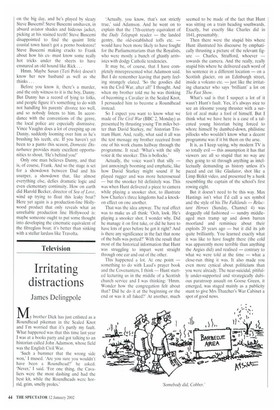Irritating distractions
James Delmgpole
My brother Dick has just enlisted as a Roundhead pikeman in the Sealed Knot and I'm worried that it's partly my fault. What happened was that this time last year I was at a books party and got talking to an historian called John Adamson, whose field was the English Civil War.
'Such a bummer that the wrong side won,' I mused. 'Are you sure you wouldn't have been a Roundhead?' he asked. 'Never,' I said. 'For one thing, the Cavaliers were the most dashing and had the best kit, while the Roundheads were horrid, grim, smelly proles.' 'Actually, you know, that's not strictly true,' said Adamson. And he went on to explain that the 17th-century equivalent of the Daily Telegraph reader — the landed gentry, the old-established toffs etc. — would have been more likely to have fought for the Parliamentarians than the Royalists, who were mostly a bunch of ghastly arrivistes with dodgy Catholic tendencies.
It may be, of course, that I have completely misrepresented what Adamson said. But I do remember leaving that party feeling strangely elated. `So the goodies did win the Civil War, after all!' I thought. And when my brother told me he was thinking of becoming a Cavalier in the Sealed Knot, I persuaded him to become a Roundhead instead.
So I expect you want to know what we made of The Civil War (BBC 2, Monday) as presented by thrusting young 'I'm miles better than David Starkey, me' historian Tristram Hunt. And, really, what said it all was the text message my brother received from one of his work chums halfway through the programme. It read: 'What's with the silly voice & the snooker. This is bollocks.'
Actually, the voice wasn't that silly — just annoyingly booming and emphatic, like how David Starkey might sound if he played rugger and was more heterosexual — but the snooker bit definitely was. This was when Hunt delivered a piece to camera while playing a snooker shot, to illustrate how Charles's three kingdoms had a knockon effect on one another.
That was the idea anyway. The real effect was to make us all think: 'Ooh, look. He's playing a snooker shot. I wonder why. Did he manage it on first take, or did he have to have lots of goes before he got it right? And is there any significance in the fact that none of the balls was potted?. With the result that most of the historical information that Hunt was struggling to impart went straight through one ear and out of the other.
This happened a lot. At one point — something to do with Laud's prayer book and the Covenanters, I think — Hunt started lecturing us in the middle of a Scottish church service and I was thinking: 'Flmm. Wonder how the congregation felt about that? Did he do it at the beginning or the end or was it all faked?' At another, much seemed to be made of the fact that Hunt was sitting on a train heading southwards. Exactly, but exactly like Charles did in 1641, presumably.
Then there were the stupid bits where Hunt illustrated his discourse by emphatically thrusting a picture of the relevant figure — Charles, Strafford, whoever — towards the camera. And the really, really stupid bits where he delivered each word of his sentence in a different location — on a Scottish glacier, on an Edinburgh street, inside a volcano etc. — just like the irritating character who says 'brilliant' a lot on The Fast Show.
What's sad is that I suspect a lot of it wasn't Hunt's fault. Yes, it's always nice to see an irksome young thruster with a surfeit of zeal make a fool of himself. But I think what we have here is a case of a talented young historian being forced to whore himself by dumbed-down, philistine pillocks who wouldn't know what a decent programme was jilt bit them on the arse.
It is, as I keep saying, why modern TV is so totally evil — this assumption it has that viewers are all so stupid that no way are they going to sit through anything as intellectually demanding as history unless it's paced and cut like Gladiator, shot like a Limp Bizkit video, and presented by a hunk resembling the captain of the school's first rowing eight.
But it doesn't need to be this way. Max Hastings isn't what I'd call a sex symbol and the style of his The Falklands — Reluctant Heroes (Sunday, Channel 4) was doggedly old fashioned — sundry middleaged men tramp up and down barren moorland and reminisce about their exploits 20 years ago — but it did its job quite brilliantly. You learned exactly what it was like to have fought there (the cold was apparently more terrible than anything the Argies did) and realised — contrary to what we were told at the time — what a close-run thing it was. It also made you even more cynical about politicians than you were already. The near-suicidal, pitifully under-supported and strategically dubious paratroop assault on Goose Green, it emerged, was staged mainly as a publicity stunt to give Mrs Thatcher's War Cabinet a spot of good news.


























































 Previous page
Previous page